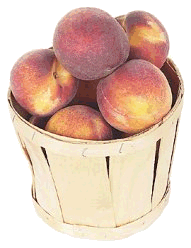The 20 Fruits and Vegetables With the Most Pesticides, the 20 With the Least ... and What to Do About It
by www.SixWise.com
Summer is the perfect time to indulge in fresh, seasonal
fruits and vegetables, but lurking on the skins (and in the
fruit itself) could be some potentially toxic chemicals: pesticides.
|

Pesticides are not just on the skins of produce, they
get absorbed into the flesh of fruits and vegetables
as well.
|
Animal and human studies on individual pesticides have shown
that they contribute to an alarming number of health problems
like:
Those especially at risk
from pesticides are children, whose bodies are still developing,
along with pregnant women, whose unborn children are extremely
susceptible to damage from these toxic chemicals.
Some argue that the amount of pesticides on produce is minimal,
and therefore not enough to influence health, however an increasing
number of experts believe that exposure to even small amounts
of pesticides over a long period of time can have a negative
impact on your health.
For instance, a new study in the journal Occupational and
Environmental Medicine found that people who had been exposed
to even low levels of pesticides were found to be 1.13 times
as likely to have Parkinson's disease as those who had never
been exposed.
By eating some of the most-contaminated fruits and vegetables,
you and your children are exposed to about 15 different pesticides
a day, according to the Environmental Working Group (EWG),
a not-for-profit environmental research organization. No one
knows for sure what impacts these chemicals that are, by their
very nature, designed to kill will have on your health.
Fortunately, by avoiding the most-contaminated produce out
there, and concentrating on the least contaminated instead,
you can reduce your exposure to pesticides by almost 90 percent,
EWG says.
How to Keep Your Food Pesticide Exposure to a Minimum
|
Wash Dem Veggies!
 Safely
remove toxic pesticides, dirt, mold and other residues
from your family's produce with Vermont Soap Organics'
Wash dem Veggies. This unique fruit and vegetable wash: Safely
remove toxic pesticides, dirt, mold and other residues
from your family's produce with Vermont Soap Organics'
Wash dem Veggies. This unique fruit and vegetable wash:
- Makes foods taste better
- All Organic-Soap based
- All-natural ingredients
- Healthy, non-toxic alternative
- Absolutely NO artificial colors, fragrances and
preservatives
- Available in 16oz or Economical Gallon Size
- No Animal Testing
- No Animal Products or By-Products
Find
out More and Order Wash Dem Veggies Fruit and Vegetable
Wash Now!
|
Contrary to popular belief, simply washing with water and
peeling fruit and vegetables is not enough to protect yourself
and your family from pesticides. It will reduce the levels
somewhat, but it will not eliminate them. In fact, the fruit
and vegetable rankings below have taken washing and typical
preparation into account (such as peeling of bananas) before
being tested for pesticides.
Meanwhile, you really don't want to peel fruits and veggies
like apples
and potatoes
because the skins contain a lot of the nutrients and antioxidants.
An excellent alternative that will help to remove pesticides
from your produce better than water alone is Vermont
Soap Organics' Wash dem Veggies . This fruit and veggie
wash naturally eliminates the pesticides, dirt, mold and other
residues found in so many of today's fruits and vegetables.
The 20 Fruits and Veggies With the MOST Pesticides
These are the ones that you should always buy organic, if
possible. If you do buy conventional versions of the following
produce, please be sure to wash them thoroughly with Wash
dem Veggies (organic produce, of course, should also be
washed just in case). These are ranked in order by EWG, with
the worst of the bunch, peaches, at #1.
|

Peaches tend to have the most pesticides of any fruit
or vegetable ... so if possible buy these organic.
|
- Peaches
- Apples
- Sweet Bell Peppers
- Celery
- Nectarines
- Strawberries
- Cherries
- Pears
- Grapes (Imported)
- Spinach
- Lettuce
- Potatoes
- Carrots
- Green Beans
- Hot Peppers
- Cucumbers
- Raspberries
- Plums
- Grapes (Domestic)
- Oranges
The 20 Fruits and Veggies With the LEAST Amount of Pesticides
According to EWG, the following produce has the lowest pesticide
load, ranked in order with the produce with the absolute lowest
pesticides first.
- Onion
- Avocado
- Sweet corn (Frozen)
- Pineapples
- Mango
- Asparagus
- Sweet peas (Frozen)
- Kiwi
- Bananas
- Cabbage
- Broccoli
- Papaya
- Blueberries
- Cauliflower
- Winter Squash
- Watermelon
- Sweet potatoes
- Tomatoes
- Honeydew melon
- Cantaloupe
Recommended Reading
Organophosphates:
What You Don't Know Can Indeed Hurt You
The
Danger of Household Insecticides Confirmed in Recent Study:
What You Can Do Instead
Sources
Occupational
and Environmental Medicine March 1, 2007
Environmental
Working Group: Food News